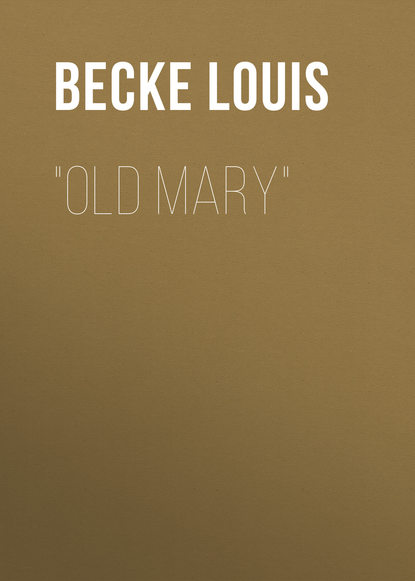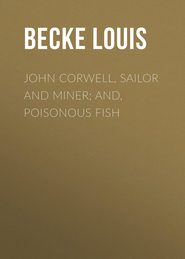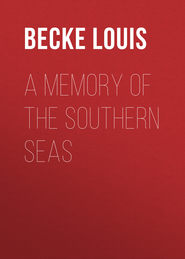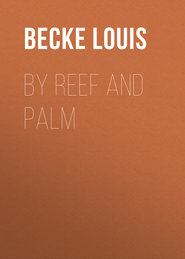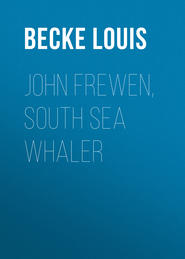По всем вопросам обращайтесь на: info@litportal.ru
(©) 2003-2024.
✖
"Old Mary"
Настройки чтения
Размер шрифта
Высота строк
Поля
“‘Then let her come with me and see the gunner of our prize,’ said he; ‘he is dying, and has asked to see her.’
“I was taken on board the Britannia, over her bloodstained decks, and into the main cabin, where poor Ohlsen was lying breathing his last. His face lit up when he saw me, and he drew me to his bosom just as he had done years before in the open boat off Tahiti. I stayed with him till the last, then one of the French privateer officers led me away.
“In the morning Mrs. Rossiter was buried; the French captains allowing some of the surviving members of the crew of the Britannia to carry her body to her grave. There was a young Spanish woman—the wife of the older captain—on board the larger of the privateers, and she took care of us three children. I cannot remember her name, but I do remember that she was a very beautiful woman and very kind to us, and told us through an interpreter that we should be well cared for, and some day go home to England; and when she learned my own particular story she took me in her arms, kissed, and made much of me.
“About noon the crew of the Britannia were ranged on deck, and the elder of the two French captains called on Robert Eury to step out.
“‘This man here,’ he said in English, indicating the coloured steward, tells me that you have buried some money belonging to the prize. Where is it?’
“‘I cannot tell you,’ replied Robert; ‘the captain’s wife told me it belonged to her children and to the little girl Mary.’
“The Frenchman laughed. ‘It belongs to us now; it is prize money, my good boy.’
“Eury looked at him steadily, but made no answer.
“’ Come,’ said the captain impatiently, ‘where is it?’
“‘I cannot tell you.’
“The younger of the captains laughed savagely, and stepped up to him, pistol in hand.
“‘I give you ten seconds to tell.’
“‘Five will do, monsieur,’ replied Robert, in French, ‘and then you will be losing five seconds of your time. I shall not tell you. But I should like to say goodbye to my dead captain’s children.’
“‘The young Frenchmen’s face purpled with fury. ‘Very well then, you fool!’ and he raised his pistol to murder the young man, when the older captain seized his arm.
“‘Shame, Pellatier, shame! Would you kill such a brave man in cold blood? Let us be satisfied with getting such a good ship. Surely you would not shoot him for the sake of a few hundred dollars?’
“‘There may be thousands. How can we tell?’ replied Pellatier.
“Robert laughed, and then raised his hand in salute to the elder captain.
“‘Captain Pellatier is right, sir. Madame Melville told me that there were thirteen hundred pounds in the bags which I have buried. And on certain conditions I will tell you where to find it.’
“‘Name them.’
“‘The money is fair prize money. That I admit. But you will never see it, unless you agree to my conditions, and pledge me your word of honour to observe them honourably. I am not afraid to die, gentlemen.’
“‘You are a bold fellow, and ought to have been a Frenchman—but be quick, name the conditions.’
“‘Half of the money to be given to these orphan children, whose pitiable condition should appeal to you. And promise me on your honour as men that you will land them at Valparaiso, or some other civilised place, from where they may reach England. If you will not make this promise, you can shoot me now.’
“‘And what of yourself?’ said Pellatier, who was a little dark man with very ugly monkey-like features; ‘you would be the guardian of this money, no doubt, my clever fellow.’
“The insulting manner in which he spoke exasperated Eury beyond endurance, and he made as if he would strike the man; but he stopped suddenly, and looking contemptuously at the Frenchman uttered the one word—
“‘Babouin!’
“It nearly cost him his life, for Pellatier, stung to fury by the loud laughter of his fellow-captain, again levelled his pistol at the young man, and again the older captain seized his arm.
“‘By Heaven, you shall not harm him!’ he cried, amid a murmur of applause from the crew. Then addressing Eury he said. I give you my promise. The children and yourself are under my protection, and when we reach Valparaiso I will put you all on shore.’ Then he ordered one of his officers to escort Robert ashore and get the money.
“Eury thanked him quietly, and then he turned to Pellatier, and said he was sorry he used an offensive word to him; but Pellatier received his apology with a scowl, and turned away. In half an hour Eury returned with the officer, carrying the money. It was counted and divided, and it was easy to see that Dupuis, the elder captain, was very pleased when the young man asked him to take charge of the half of the money belonging to the Rossiter children and myself.
“The three ships sailed in company for South America a week later. I remained on board the Britannia together with Robert Eury and six others of her original crew, the Rossiter children being taken by the Spanish lady on board the larger of the privateers, the second lieutenant of which, with about twenty men, were drafted to the prize. After keeping in close company for four or five days we lost sight of the privateers, much to the annoyance of our captain, who was a very indifferent navigator, as he soon showed by altering his course to E. by S. so as to pick up the coast of South America as soon as possible. This was a most fortunate thing for us, for at daylight on the following morning two sail were seen, not five miles distant, and to our intense delight proved to be English letters of marque—the barque Centurion of Bristol and the barque Gratitude of London. They at once closed in upon and engaged us, and although the Frenchmen made a good fight, they had to strike after a quarter of an hour’s engagement, for the Centurion was a very heavily armed ship.
“Her captain was a very old man named Richard Glass. He came on board the Britannia and spoke very good-humouredly to the French lieutenant, for on neither side had any one been killed, and he saw that the Britannia was a fine ship. He told the Frenchmen to take the longboat, and as much provisions and water as they liked, and make for the coast, which was less than seventy miles distant. This was soon done, and our former captors parted from us very good friends, every one of them coming up and shaking hands with Robert Eury and calling him bon camarade.
“Captain Glass put his own chief officer in charge of the Britannia (with Robert as his mate) and ordered him to proceed to Port Jackson and await the arrival there of the Centurion and her consort. We arrived at our destination safely, and as soon as my story was known many kind people wanted to adopt me; but the agent of the Britannia took me to his own home, where I lived for many happy years as a member of his family. Robert Eury was then appointed mate of a vessel in the China trade, but I saw him every year. Then when I was seventeen years of age he asked me to marry him, and I did so gladly, for he was always present in my thoughts when he was away, and I knew he loved me.”
III
“My husband invested his savings in a small schooner, which he named the Taunton and within a month of our marriage we were at sea, bound on a trading voyage to Tahiti and the Paumotus. This first venture proved very successful, so did the two following voyages; and then, as he determined to found a business of his own in the South Seas, he bought a large piece of land on this island from the natives, with whom he was on very friendly terms. His reasons for choosing this particular island were, firstly, because of its excellent situation—midway between Port Jackson and the Spanish settlements on the South American coast, which were good markets; secondly, because great numbers of the American whaling ships would make it a place of call to refresh if there was a reputable white man living on the island; and thirdly, because he intended to go into sperm whaling himself, for it was an immensely profitable business, and he could, if he wished, sell the oil to the American ships instead of taking it to Port Jackson. The natives here in those days were a very wild set, but they really had a great friendship and respect for my husband; and when they learnt that he intended to settle among them permanently they were delighted beyond measure. They at once set to work and built us a house, and the chief and my husband exchanged names in the usual manner.
“My first child was born on the island whilst my husband was away on a voyage to Port Jackson, and, indeed, of my four children three were born here. When Robert returned in the Taunton he brought with him a cargo of European stores and comforts for our new home, and in a few months we were fairly settled down. From the first American whaleships that visited us he bought two fine whaleboats and all the necessary gear, and then later on engaged one of the best whalemen in the South Seas to superintend the business. In the first season we killed no less than six sperm whales, and could have taken more, but were short of barrels. The whaling station was at the end of the south point of the harbour, and when a whale was towed in to be cut in and tried out the place presented a scene of great activity and bustle, for we had quite two hundred natives to help. Alas, there is scarcely a trace of it left now! The great iron try-pots, built up in furnaces of coral lime, were overgrown by the green jungle thirty years ago, and it would be difficult even to find them now.
“The natives, as I have said, were very wild, savage, and warlike; but as time went on their friendship for my husband and myself and children deepened, and so when Robert made a voyage to Port Jackson or to any of the surrounding islands I never felt in the least alarmed. I must tell you that we—my husband and myself—were actually the first white people that had landed to live on the island since the time of the Bounty mutiny, when Fletcher Christian and his fellow mutineers tried to settle here. They brought the Bounty in, and anchored her just where your own schooner is now lying—opposite Randle’s house. But the natives attacked Christian and his men so fiercely, and so repeatedly, though with terrible loss to themselves, that at last Christian and Edward Young abandoned the attempt to found a settlement, and the Bounty went back to Tahiti, and finally to Afitâ, as the people here call Pitcairn Islands.
“Four years passed by. My husband was making money fast, not only as a trader among the Paumotus and the Society Islands, where he had two small vessels constantly employed, but from his whale fishery. Then came a time of sorrow and misfortune. A South Seaman, named the Stirling Castle, touched here for provisions, and introduced small-pox, and every one of my poor children contracted the disease and died; many hundreds of the natives perished as well. My husband at this time was away in one of his vessels at Fakarava Lagoon in the Paumotu Group, and I spent a very lonely and unhappy seven months before he returned. Almost every morning, accompanied by one or two of my native women servants, I would ascend that rugged peak about two miles from here, from where we had a complete view of the horizon all round the island, and watch for a sail. Twice my heart gladdened, only to be disappointed again, for the ships on both occasions were Nantucket whalers. And then, as the months went by, I began to imagine that something dreadful had happened to my husband and his ship among the wild people of the Paumotus, for when he sailed he did not expect to be away more than three months.
“At last, however, when I was quite worn out and ill with anxiety, he returned. I was asleep when he arrived, for it was late at night, and his vessel had not entered the harbour, though he had come ashore in a boat. He awakened me very gently, and then, before I could speak to him and tell him of our loss, he said—
“‘Don’t tell me, Molly. I have heard it all just now. But, there, I’m home again, dear; and I shall never stay away so long again, now that our children have been taken and you and I are alone.’
“After another year had passed, and when I was well and strong again, the whaleship Chalice of Sag Harbour, Captain Freeman, touched here, and the master came on shore. He was an old acquaintance of my husband’s, and told us that he had come ashore purposely to warn us of a piratical vessel which had made her appearance in these seas a few months before, and had seized two or three English and American ships, and murdered every living soul of their crews. She hailed from Coquimbo, and her captain was said to be a Frenchman, whilst her crew was composed of the worst ruffians to be found on the coast of South America—men whose presence on shore would not be tolerated even by the authorities at any of the Spanish settlements from Panama to Valdivia. Sailing under French colours, and professing to be a privateer, she had actually attacked a French merchant brig within fifty miles of Coquimbo Roads, the captain and the crew of which were slaughtered and the vessel plundered and then burnt. Since then she had been seen by several vessels in the Paumoto archipelago, where her crew had been guilty of the most fearful crimes, perpetrated on the natives.
“My husband thanked Freeman for his information; but said that if the pirate vessel came into Tubuai Lagoon she would never get out again, except under British colours. This was no idle boast, for not only were my husband’s two vessels—which were then both at anchor in the lagoon—well armed, but they were manned by English or English-blooded half-caste seamen, who would have only been too delighted to fight a Frenchman, or a Spaniard, or a Dutchman.
“Ah, ‘tis so long ago, but what brave, rough fellows they were! Some of them, we well knew, had been transported as convicts, and were, when opportunity offered, drunken and dissolute, but to my husband and myself they were good and loyal men. Two of them had seen Trafalgar day in the Royal Sovereign under Collingwood when that ship had closed with the Santa Anna and made her strike. Their names—as given to us—were James Watts and Thomas Godwin. After the fleet returned to England they got into mischief, and were transported for being concerned in a smuggling transaction at Deal, in Kent, in which a preventive officer was either killed or seriously wounded—I forget which. Their exemplary conduct, however, had gained them a remission of their sentences, and the Governor of New South Wales, who was most anxious to open up the South Sea Island trade, had recommended them to my husband as good men, Godwin having been brought up to the boatbuilding trade at Lowestoft in England, and Watts as a gunsmith.
“About ten days after the visit of the Chalice my husband left in one of his vessels for Vavitao—only a day’s sail from here. He wanted me to go with him, but I was too much interested in a large box of English seeds, and some young fruit trees which the Governor of New South Wales had sent to us, and so I said I would stay and watch our garden, in which I took a great pride. He laughed and said that I must not forget to look out for ‘Freeman’s pirate’ as well as for my garden. He never for one moment imagined that the French vessel would turn up at Tubuai.
“He took with him Thomas Godwin and William Myson, leaving Watts, who was master of the other vessel, with me, to attend to the whaling.
“A week after he had sailed I set out to walk to the north end of the island, where my children were buried. I had with me an active native boy named Tati—who was carrying some plants and seeds which I intended planting on and about the children’s graves—and two young women. We started early in the morning, for I intended staying at the north end till late in the afternoon, whilst the two girls went crayfishing on the reef.
“About noon I had finished my labours, and then, as it was a beautifully bright day, I climbed a hill near by, called ‘The White Man’s Lookout,’ which commanded a clear view of the sea all round the island. It had been given this name by the natives, who said that Fletcher Christian and his fellow-mutineer, Edward Young, had often ascended the hill and gazed out upon the ocean, for they were fearful that at any moment a King’s ship might appear in pursuit of their comrades and themselves.
“I was again feeling somewhat anxious on account of my husband. He should have returned a week before, for there had been no bad weather, and I knew that his business at Vavitao should have kept him there only a day at the most. But the moment I gained the summit of the hill my heart leapt with joy, for there were two vessels in sight, one of which I at once recognised as my husband’s. They were about a mile distant, and were running before the wind for the harbour. The strange vessel, which was a brigantine, was following close astern of our own schooner—evidently, I thought, my husband is showing her the way into the lagoon.
“Just as I was preparing to descend the hill my little companion, the native boy, Tati, drew my attention to four canoes which, in company with a boat from Captain Watts’ schooner, were approaching the vessels.
“‘Ah,’ I thought, ‘Watts has seen the vessels from the whaling station, and is going out to meet them.’
“But presently something occurred which filled me with terror. When the boat and canoes were quite close to the vessels, they both luffed, and fired broadsides into them; the boat and two canoes were evidently destroyed, and the two remaining canoes at once turned round and headed for the shore, the brigantine firing at them with guns which I knew to be long twenty-fours by the sharp sound they made. In a moment I knew what had happened—my husband’s ship had been captured by the French privateer of which Captain Freeman had told us, and the Frenchmen were now coming to seize our other selves lying anchored in the lagoon.
“Tati looked at me inquiringly.





